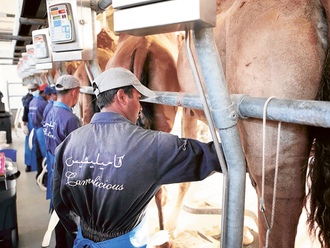Japan responds
In response to Yuji Hosaka’s article, I would like to point out that Japan and the Republic of Korea enjoy friendly relations (‘Japan’s unjust claims over Dokdo,’ Gulf News, October 14). The relationship is not only based on our shared belief in common values, such as democratic and free-market principles. But, we also share an extensive social and cultural interaction including people-to-people exchanges. However, it is regrettable that we have differences over Takeshima.
Japan had established its sovereignty over Takeshima by mid-seventeenth century at the latest, and during the early part of the Edo period (1603-1868). Japanese merchants engaged in fishing and hunting in the area under license from the Shogunate (the national government of the time). The Japanese cabinet decision in 1905 to incorporate Takeshima into the Shimane Prefecture was therefore simply a reaffirmation of Japan’s sovereignty over the island. This is why it is not relevant to associate the Takeshima issue with the history between the two countries during the twentieth century.
Japan seeks to resolve the territorial dispute in a calm, fair and peaceful way based on international law. This year on August 21, Japan presented the Republic of Korea with a proposal to institute legal proceedings before the International Court of Justice (ICJ), by a special agreement between the two countries. They also proposed conciliation based on the existing exchange of notes concerning dispute settlement. Unfortunately, those proposals were not accepted.
Japan continues to hope that this issue will be resolved in the light of historical evidence and in accordance with international law. We also hope that the Republic of Korea will accept our proposal to refer the issue to the ICJ in order to prevent it from having a negative impact on our otherwise excellent bilateral relationship. The people of Japan have a great deal of respect for Korean culture and society. Many Japanese including myself value our personal relationships with Korean friends over the years. We should not let this issue spill over and damage our overall relationship.
From Mr Daisuke Matsunaga
Consul General of Japan in Dubai
Quality toys for children
I was elated when I came to know that plastic and other hazardous toys will be banned. It is a good step taken by the Dubai municipality. These toys might look very attractive to children but they are unaware of the consequence these toys could cause. If children swallow or puts these toys in their mouth, they can actually risk their lives. I think that parents should pay attention towards the quality of toys the children play with and encourage them to use toys manufactured by standardised companies only. Child safety is the responsibility of the parents. But now that the authorities have banned the hazardous toys, I am happy that the parents or children will not face such issues.
From Mr Raunak Kapur
UAE
Celebration or destruction?
The news of celebratory gunfire at a wedding party in eastern Saudi Arabia, bringing down an electric cable causing an electrical fire is regrettable and warrants an investigation. This led to electrocuting 25 people and injuring 30 others. A high-voltage power line fell down and sent sparks flying after it was hit by celebratory gunfire. The power transformer is believed to have come in contact with a metal door at the courtyard’s only exit, causing electrocution of the victims as they fled the scene. A photograph of the aftermath posted online showed a large courtyard strewn with fallen chairs and a pole in the middle supporting strings of lights. In July 1999, 76 people died in a similar incident. However, last month Saudi Arabia banned the discharge of firearms at weddings - a popular tradition in tribal areas of the country.
From Mr Gerry Coughlan
Dublin, Ireland
Weekend timings
I think it was partially a good idea to keep the malls open 24 hours during Eid (‘Night shopping deals elude Dubai retailers,’ Gulf News, November 4). However, on such occasions people usually shop in advance or on weekends. It would have been better if the stores in the shopping malls were open until 2am rather than the entire night. But the idea of having the restaurants, food courts and the cinemas open all night, worked very well. I think these should be the standard timings on weekends through the year.
From Ms Sumaiyah
Dubai
Website comment
Not required
I was never very convinced with the idea of people shopping all night, as most people would be sleeping after their hectic long day. There are a few people who stay out at night, but that is usually for a party and not shopping. However, the idea of having food outlets open through the night was a great idea. But in areas like Al Rigga and Al Diyafa, cafeterias and restaurants serve food until 3am anyway.
From Ms Jhun
Dubai
Website comment
Editor’s note: Do you have an opinion about a news report we published? Share your views on it at readers@gulfnews.com or post a comment on our Facebook page. You can also tweet to @GNReaders








